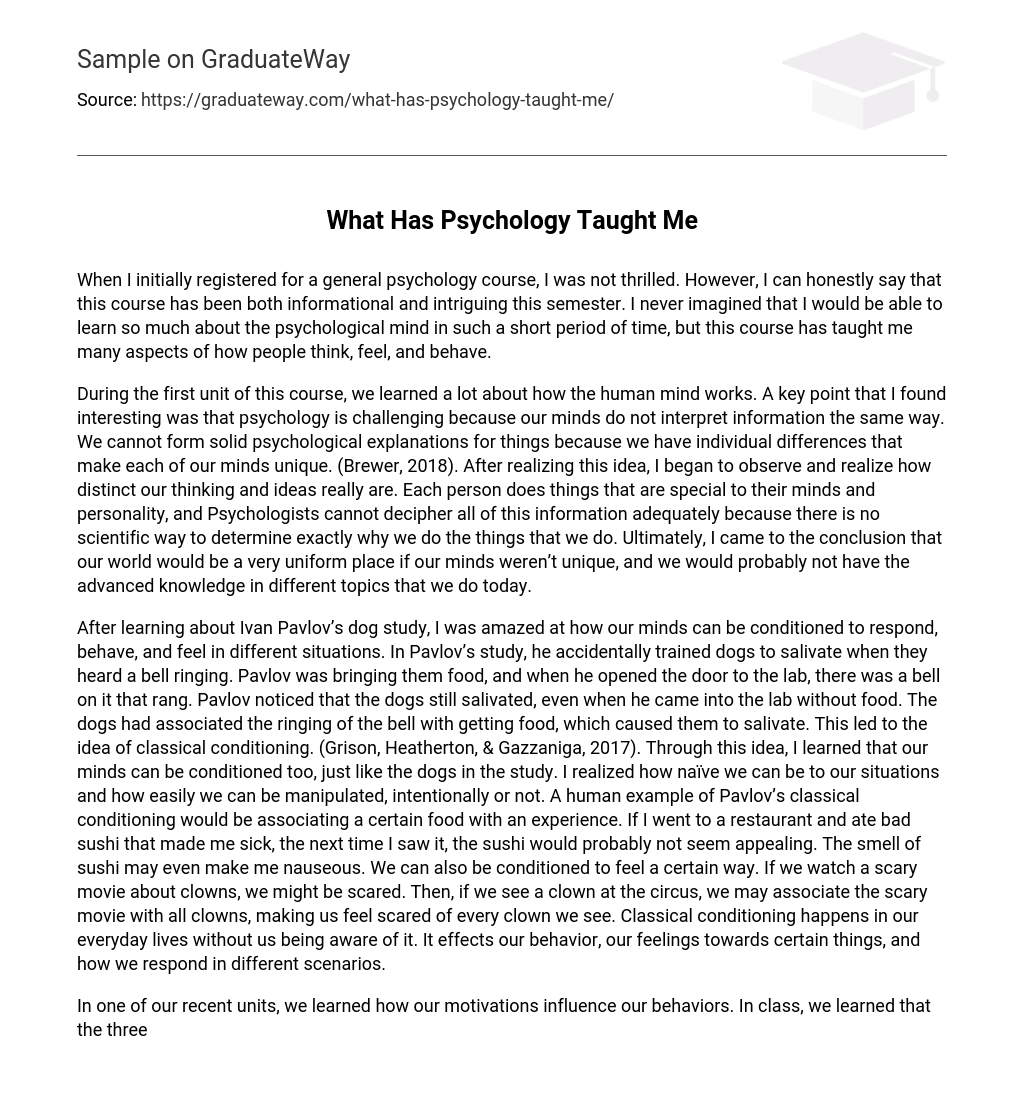When I initially registered for a general psychology course, I was not thrilled. However, I can honestly say that this course has been both informational and intriguing this semester. I never imagined that I would be able to learn so much about the psychological mind in such a short period of time, but this course has taught me many aspects of how people think, feel, and behave.
During the first unit of this course, we learned a lot about how the human mind works. A key point that I found interesting was that psychology is challenging because our minds do not interpret information the same way. We cannot form solid psychological explanations for things because we have individual differences that make each of our minds unique. (Brewer, 2018). After realizing this idea, I began to observe and realize how distinct our thinking and ideas really are. Each person does things that are special to their minds and personality, and Psychologists cannot decipher all of this information adequately because there is no scientific way to determine exactly why we do the things that we do. Ultimately, I came to the conclusion that our world would be a very uniform place if our minds weren’t unique, and we would probably not have the advanced knowledge in different topics that we do today.
After learning about Ivan Pavlov’s dog study, I was amazed at how our minds can be conditioned to respond, behave, and feel in different situations. In Pavlov’s study, he accidentally trained dogs to salivate when they heard a bell ringing. Pavlov was bringing them food, and when he opened the door to the lab, there was a bell on it that rang. Pavlov noticed that the dogs still salivated, even when he came into the lab without food. The dogs had associated the ringing of the bell with getting food, which caused them to salivate. This led to the idea of classical conditioning. (Grison, Heatherton, & Gazzaniga, 2017). Through this idea, I learned that our minds can be conditioned too, just like the dogs in the study. I realized how naïve we can be to our situations and how easily we can be manipulated, intentionally or not. A human example of Pavlov’s classical conditioning would be associating a certain food with an experience. If I went to a restaurant and ate bad sushi that made me sick, the next time I saw it, the sushi would probably not seem appealing. The smell of sushi may even make me nauseous. We can also be conditioned to feel a certain way. If we watch a scary movie about clowns, we might be scared. Then, if we see a clown at the circus, we may associate the scary movie with all clowns, making us feel scared of every clown we see. Classical conditioning happens in our everyday lives without us being aware of it. It effects our behavior, our feelings towards certain things, and how we respond in different scenarios.
In one of our recent units, we learned how our motivations influence our behaviors. In class, we learned that the three fundamental motives were hunger, sex, and belonging. (Brewer, 2018). After learning about these ideas in class, I observed how almost all of our actions are directed towards these fundamental motivations. If we’re hungry, we eat. If we’re lonely, we call a friend to talk. If we see our significant other, we may be inclined to have sex with them. Everything that we do has a reason behind it, and I was blind to this idea before this class. I quickly associated a “real- life” example of how motivations effect behavior. In high school, there was a homeless man that would always walk around my small town. He wasn’t always homeless, in fact, he was a very well-liked man in our community. I can almost guarantee that if anyone in my hometown was asked to describe him, they would say that he was a good person. He had just endured a lot of hardships that led him to being homeless. A few months ago, I saw a newspaper article about the man. He had been arrested for stealing food from the grocery store. I know that this is undoubtedly an example of how motives effect behavior. He was so hungry that he took drastic measures in order to eat. How we behave is definitely directed by our motives, and it can definitely change your perception of a person.
Overall, I have learned so much from taking this class. I have thoroughly enjoyed discovering new things about the mind and how it works. Psychology is much more complex than I once thought, and it has definitely helped me gain insight on how people think, feel, and behave.





